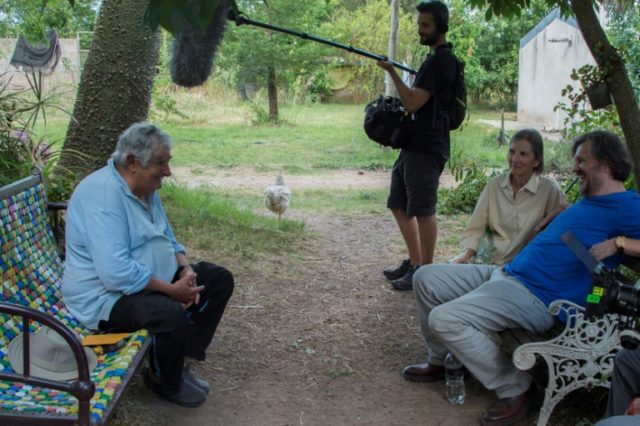Montevideo (AFP) – Acclaimed filmmaker Emir Kusturica doesn’t hide his admiration for the subject of his latest film, Uruguayan ex-president Jose Mujica, a leftist rabble-rouser nicknamed “the world’s poorest president.”
To the Serbian director, he is simply “The Last Hero” — the title of the documentary he has just finished shooting at Mujica’s run-down farmhouse.
He describes the project as the culmination of a long love affair with the Latin American left, which has few heroes these days.
“I am a born idealist,” said Kusturica, a two-time winner of the top prize at the Cannes Film Festival, the Palme d’Or.
“I developed a special vision of the world that is linked to the people I admired from my youth, from Che Guevara to (Fidel) Castro,” he told AFP.
“Since I couldn’t make anything with these two” — both deceased — “when I heard about a man who was a president and still driving his tractor and fixing his house… I said, ‘This is my man.’ And I was not wrong.”
Mujica rose to fame during his presidency (2010-2015) by living in his rustic farmhouse, driving himself around in his beat-up Volkswagen Beetle and donating most of his salary to charity.
Now an 81-year-old senator, Mujica made waves as president by delivering tirades against unfettered capitalism and consumption at the United Nations and international summits.
A colorful character known as much for his devotion to his three-legged dog as his landmark initiatives legalizing marijuana, abortion and gay marriage, Mujica is simply called “Pepe” in Uruguay — his nickname among both admirers and critics.
And there are plenty of the latter, even if Mujica remains popular.
Disgruntled allies on the left say he failed to keep promises such as education reform. Across the aisle, enemies blame him for rising crime and revile his past as an urban guerrilla.
“Some people in Uruguay do not like what he does, which is natural,” said Kusturica.
“However popular he is around the world, he is not as popular as I wish. He is not a mainstream popularity man.”
– Unlikely film star –
With his rumpled sweaters and bushy gray eyebrows, Mujica makes an unlikely film star.
But to Kusturica — director of such films as “Black Cat, White Cat,” “Time of the Gypsies” and “Underground” — he is an icon.
“The complicated history of this country and any other country is synthetized in the experience of Mujica,” he said.
As a young man, Mujica was caught up in the revolutionary movements then sweeping Latin America. In the 1960s and 70s, he was a leader in the Tupamaros, an urban guerrilla movement inspired by the Cuban Revolution.
Captured and jailed, he spent 14 years in prison — much of it in squalid conditions, held at the bottom of an old well by the military regime then in power.
Freed under a 1985 amnesty law after the restoration of democracy, he became a lawmaker, minister and eventually president — all while keeping up work on his humble farm outside the capital, Montevideo.
“I want to get into the deep connection between his personality… and his connection to the land,” said Kusturica.
“He’s almost religiously… connected to the land.”
The documentary, which combines interviews with archival footage from Mujica’s presidency, centers on his final day as president, handing power to his successor and ally, Tabare Vazquez.
Kusturica recently wrapped up filming at Mujica’s “chacra,” or farm, where the ex-president has hosted such dignitaries as Spain’s former king Juan Carlos.
With his sleeves rolled up, wearing a hat, baggy pants and plastic sandals, Mujica answered Kusturica’s questions.
He was luke-warm when asked how he felt about the project.
“It will help people get to know Uruguay. It has a lot to offer the world,” Mujica said of his country of 3.4 million people and three times as many cows.
“I don’t know what Kusturica will do with it, because he’s half” — he broke off, signaling “crazy” with one hand — “and half genius. But I respect him a lot.”
He hopes the film will send a message of “humility and commitment,” he said.
Kusturica meanwhile said he hopes to have the film ready in time for the Venice Film Festival in September.

COMMENTS
Please let us know if you're having issues with commenting.